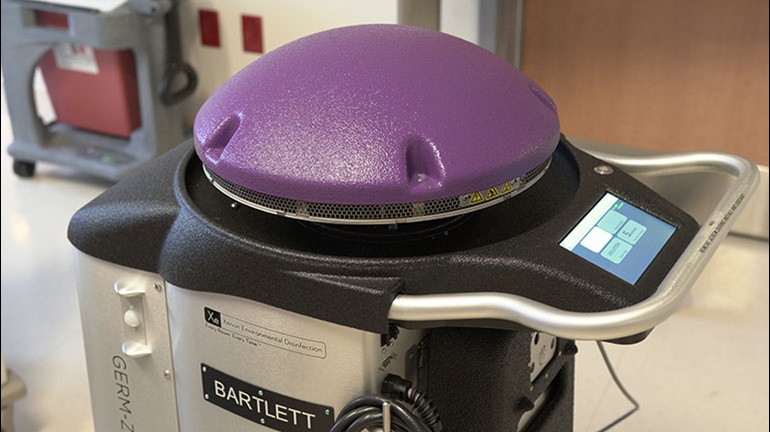
Fraser Health has new weapons at our disposal to combat COVID-19 and other infectious diseases, as 14 new Ultraviolet Germicidal Irradiation (UVGI) robots are deployed to hospitals across the Fraser Health region to kill viruses and bacteria.
The fleet will join two existing robots – fondly known as Phoenix and Haley – in targeting germs that linger on surfaces and can potentially cause infections. Fraser Health staff voted to name two of the newcomers – Bonnie and Henry – after Dr. Bonnie Henry, B.C.’s Provincial Health Officer.
The robots cost approximately $2 million in total and are funded in part by generous donors who support their local hospital foundations. Surrey Hospitals Foundation, Royal Columbian Hospital Foundation, Peach Arch Hospital Foundation, Delta Hospital and Community Health Foundation, Burnaby Hospital Foundation, Langley Memorial Hospital Foundation, and the Fraser Valley Health Care Foundation fundraised specifically for the robots.
“As we enter deeper into phase two of the pandemic, I applaud our partners for their assistance in fighting back against the virus with their generosity and innovation,” said Health Minister Adrian Dix. “A warm welcome to ‘Bonnie and Henry’ and I hope their presence in hospitals in Fraser Health makes a huge impact in making hospitals safer for everyone.”
“We are grateful for the generosity of our community,” says Dr. Victoria Lee, President and CEO, Fraser Health. “It is through their support that our UVGI program has grown from a pilot project with two robots to a comprehensive program with 16 in just four years.”
The Xenex LightStrike Germ-Zapping robots emit short pulses of UV light, damaging the DNA and RNA of harmful pathogens, including severe acute respiratory syndrome coronavirus-2 (SARS-CoV-2), Clostridioides difficile (C. difficile), carbapenemase-producing organisms (CPO), Candida auris (C. auris), and methicillin-resistant Staphylococcus aureus (MRSA).
The robots light up a room as they disinfect, removing viruses and bacteria in as little as 20 minutes. Fraser Health’s two resident UVGI robots are working overtime during the COVID-19 pandemic to help keep patients safe by disinfecting rooms and units in acute and community settings where the virus is present.
Housekeeping and clinical staff plan the robots’ schedule. The robots themselves keep an internal time-sheet of where and when they work and the data is sent to a server so Fraser Health can monitor usage. They may be the flashiest part of the infection team, but the robots don’t work alone. An Environmental Services (EVS) operator is at the controls, working with Fraser Health Infection Prevention and Control, housekeeping staff and health care aides using traditional and chemical cleaning methods.
“Environmental cleaning is an essential component of our multi-pronged approach to reducing hospital-acquired infections,” says Dr. Elizabeth Brodkin, Chief Medical Health Officer, Fraser Health. “We have made tremendous strides in recent years in enhancing our infection prevention and control practices. UVGI is another layer to keep our patients safe.”
Since UVGI disinfection was introduced in 2016, Fraser Health has seen a reduction in some hospital-acquired infections, such as C. difficile and MRSA.
Fraser Health is responsible for the delivery of hospital and community-based health services to over 1.8 million people in 20 diverse communities from Burnaby to Fraser Canyon on the traditional territories of the Coast Salish peoples. Our team of nearly 40,000 staff, medical staff and volunteers is dedicated to serving our patients, families and communities to deliver on our vision: Better health, best in health care.
Watch Fuad Ibrahimov, leader, Evaluation and Quality Improvement, Fraser Health explain how the Ultraviolet Germicidal Irradiation (UVGI) robots 'Bonnie' and 'Henry' work:
For media inquiries, please contact:
media@fraserhealth.ca
